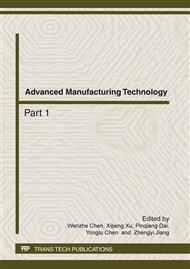[1]
K K Tan, S. N. Huang and T H Lee. Robust adaptive numerical compensation for friction and force ripple in permanent-magnet linear motors. IEEE Transactions on magnetics, 2002, 38(1): 221-228.
DOI: 10.1109/20.990111
Google Scholar
[2]
K J Astrom and B Witternmark. Adaptive control. Reading, MA: Addison-Wesley, 1995.
Google Scholar
[3]
X Ye and H Unbehauen. Global adaptive stabilization for a class of feedforward nonlinear systems. IEEE Transactions on Automatic Control, 2004, 49(5):786-792.
DOI: 10.1109/tac.2004.825610
Google Scholar
[4]
Y Fang, X Xiao and et al. Adaptive learning control for a class of nonlinearly parameterized uncertain systems. Proceedings of 2005 American Control Conference. Portland, USA, 2005:196-201.
DOI: 10.1109/acc.2005.1469931
Google Scholar
[5]
Bojun Ma, Yongchun Fang, Xiao Xiao. Switching logic-based adaptive robust control of nonlinearly parameterized uncertain systems. Acta Automatica Sinica, 2007, 33(6):668-672.
DOI: 10.1360/aas-007-0668
Google Scholar
[6]
L B Kira and G A Andrew. A cross-coupled iterative learning control design for precision motion control. IEEE Transactions on Control Systems Technology, 2008, 16(6):1218-1231.
DOI: 10.1109/tcst.2008.919433
Google Scholar
[7]
D R James, L L Paul, et al. Norm-optimal iterative learning control applied to gantry robots for automation applications. IEEE Transactions on Robotics, 2006, 22(6):1303-1307.
DOI: 10.1109/tro.2006.882927
Google Scholar
[8]
A Tayebi, S Abdul, et al. Robust iterative learning control design: application to a robot manipulator. IEEE/ASME on Mechatronics, 2008, 13(5):608-613.
DOI: 10.1109/tmech.2008.2004627
Google Scholar
[9]
L Xu, and B Yao. Adaptive robust repetitive control of a class of nonlinear systems in normal form with applications to motion control of linear motors. In Proc. IEEE/ASME Int. Conf. Advanced Intelligent Mechtronics, Como, Italy, Jul. 2001, pp.527-532.
DOI: 10.1109/aim.2001.936519
Google Scholar
[10]
Chenglun Chen and Yenhsiu Yang. Adaptive repetitive control for uncertain variable-speed rotational motion systems subject to spatially periodic disturbances. In Proc. of the 2007 American Control Conference, New York, USA, July 2007, pp.564-569.
DOI: 10.1109/acc.2007.4282508
Google Scholar
[11]
Mingxuan Sun, Shuzhi Sam Ge and M Y Mareels Iven. Adaptive repetitive learning control of robotic manipulators without the requirement for initial repositioning. IEEE Transactions on Robotics, 2006, 22(3):563-568.
DOI: 10.1109/tro.2006.870650
Google Scholar
[12]
Kyungbae Chang, Iljoo Shim and Gwitae Park. Adaptive repetitive control for an eccentricity compensation of optical disk drivers. IEEE Transactions on Consumer Electronics, 2006, 52(2):446-451.
DOI: 10.1109/tce.2006.1649662
Google Scholar
[13]
Mingxuan Sun and Shuzhi Sam Ge. Adaptive repetitive control for a class of nonlinearly parametrized systems. IEEE Transactions on Automatic Control, 2006, 51(10): 1684-1688.
DOI: 10.1109/tac.2006.883028
Google Scholar
[14]
Yunping Sun, Junmin Li and Guo Zhang. Adaptive repetitive learning control for a class of time-varying systems. In Proc. of the 26th Chinese Control Conference, Hunan, China, July 2007, pp.766-770.
DOI: 10.1109/chicc.2006.4347056
Google Scholar
[15]
L X Wang. A course in fuzzy systems and control. Englewood Cliffs, NJ: Prentice-Hall, 1997.
Google Scholar
[16]
H P Du, Nong Zhang. Fuzzy control for nonlinear uncertain electrohydraulic active suspensions with input constraint. IEEE Transactions on Fuzzy Systems, 2009, 17(2): 343-356.
DOI: 10.1109/tfuzz.2008.2011814
Google Scholar
[17]
M I El-Hawwary, A L Elshafei, et al. Adaptive fuzzy control of the inverted pendulum problem, IEEE Transactions on Control System Technology, 2006, 14(6):1135-1144.
DOI: 10.1109/tcst.2006.880217
Google Scholar
[18]
M S Ju, C C K Lin, et al. A rehabilitation robot with force-position hybrid fuzzy controller: hybrid fuzzy control of rehabilitation robot. IEEE Transactions on Neural Systems and Rehabilitation Engineering, 2005, 13(3):349-358.
DOI: 10.1109/tnsre.2005.847354
Google Scholar
[19]
K Y Lian, J J Liou, C Y Huang. LMI-based integral fuzzy control of DC-DC converters. IEEE Transactions on Fuzzy Systems, 2006, 14(1):71-80.
DOI: 10.1109/tfuzz.2005.861610
Google Scholar
[20]
Y S Kung, M H Tsai. FPGA-based speed control IC for PMSM drive with adaptive fuzzy control. IEEE Transactions on Power Electronics, 2007, 22(6):2476-2486.
DOI: 10.1109/tpel.2007.909185
Google Scholar
[21]
L X Wang. Fuzzy systems are universal approximates. In Proc. IEEE Int. Conf. Fuzzy Syst., San Diego, CA, 1992:1163-1170.
Google Scholar
[22]
L X Wang, J M Mendel. Fuzzy basis functions, universal approximation, and orthogonal least-squares learning. IEEE Trans. Neural Netw., 1992, 3(5):807-814.
DOI: 10.1109/72.159070
Google Scholar


